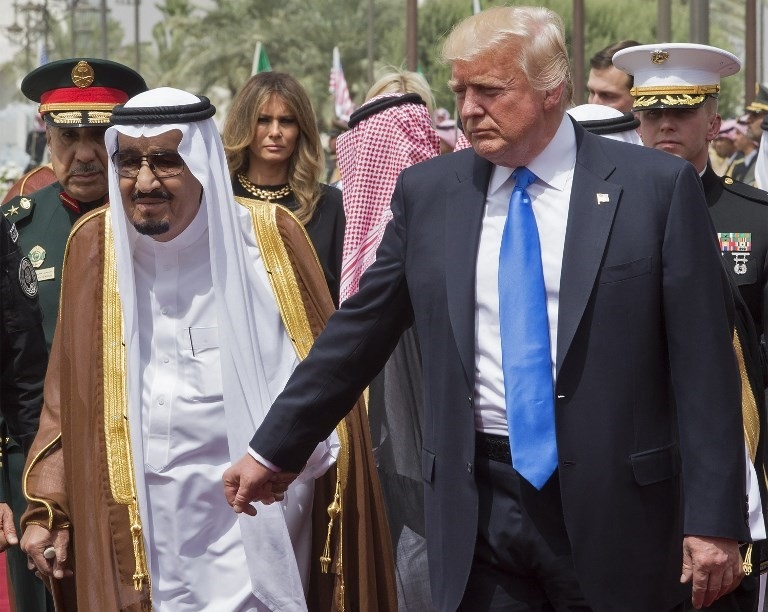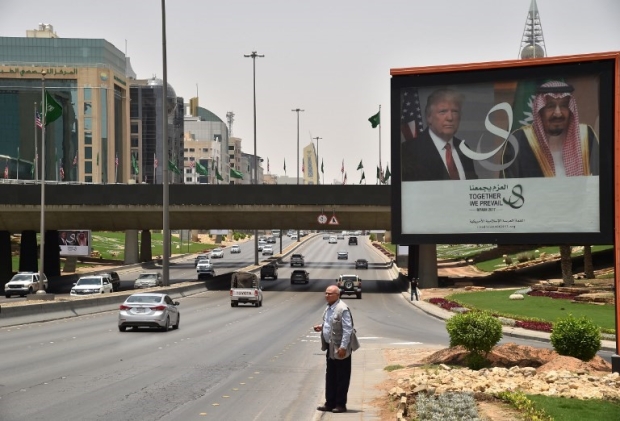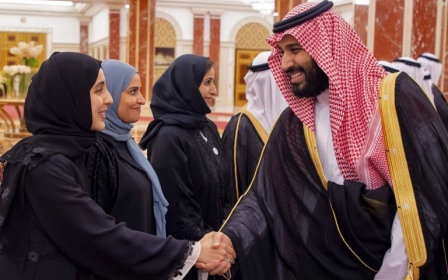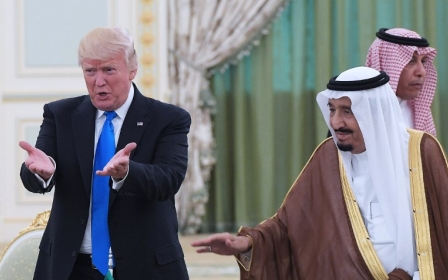Imagined sovereignty: How Donald Trump is humiliating Saudi Arabia

How long can the Saudi regime remain deaf to its regular humiliation at the hands of US President Donald Trump?
The answer is: for a long time.
Trump does not miss an opportunity to remind his Saudi proteges that without the US, the regime would be exposed to troubling winds coming from both the domestic front and the region. "Hey, I love Saudi Arabia ... King Salman, you've got trillions, and without us ... you won't be able to keep those aeroplanes ... without us who knows!"
These were his latest insults that a different, respectable president trained in the art of high diplomacy would never have uttered when addressing his partners in a region where friends of the United States are increasingly becoming an extinct species. Trump knows he can get away with even worse slander.
Saudi regime vulnerability
From US backing for the treacherous war in Yemen to Washington telling Riyadh to keep the price of oil low, Trump does not miss an opportunity to remind the Saudi regime of its vulnerability without America.
The relationship between Saudi Arabia and the US under Trump is a naked one, void of the veneer of the polite language of diplomacy, partnerships and alliances. It is a transactional one in which the strong party stampedes on the weak one, as Trump knows well how fragile the Saudi regime is. Consequently, by regularly reminding the Saudis of their vulnerability, Trumps keeps them on their toes, always eager to please and deliver the required token in return for protection.
The relationship between Saudi Arabia and the US under Trump is a naked one, void of the veneer of the polite language of diplomacy, partnerships and alliances
Saudi Arabia will continue to pay a high price for its total dependence on the US for regime security. The Saudis know well the consequences of the US withdrawing its unconditional support, leaving it totally exposed to unexpected hazards.
The Saudi regime, however, flexes its muscles when other less strategically vital Western governments criticise its domestic policies, such as the detention of Saudi human right activists and critics, or the abysmal killing of civilians in Yemen.
Canada, Germany, Sweden, Norway, Spain and others have occasionally made noises about Saudi domestic repression and misguided regional policies, but the reaction was swift. They were punished immediately as a deterrent lest other governments that may contemplate antagonising the Saudis, or those that daren't do so, like Britain, utter a word of criticism.
Imagined sovereignty
In such cases, the regime overreacts. It suspends entry visas to nationals of these countries, revokes commercial contracts and swiftly withdraws ambassadors. It even starts a smear campaign against them in its controlled media. Saudi Foreign Minister Adel Jubair unexpectedly threatened Canada with a separatist Quebec as he reminded his audiences of the minority problem in North America.
The Saudis forget that Canada is not Iran, where the Saudis can dangle the flag of the suppressed Arab Sunni minority, the Ahvazis, as a weapon against the Iranian regime or even support one of the most suspicious opposition parties, namely Mujahidin el-Khalq.
The Saudi regime absorbs the insult and moves on to deliver the expected total submission to the will of the power that protects the monarchy
The regime uses such incidents of conflict with Canada or others as an opportunity to demonstrate its imagined sovereignty. The rhetoric - though misguided, unjustified and pointless - pleases its domestic audiences who cheer the bravado of their leadership.
But when it comes to the US, a different picture emerges. The Saudi regime absorbs the insult and moves on to deliver the expected total submission to the will of the power that protects the monarchy. The local press ignores Trump's harsh words.
From dangling charts of Saudi military spending in front of Crown Prince Mohammed bin Salman and cameras, to pointing to the vulnerability of the Saudi regime without the United States, Trump knows well he can continue to fire off insults without the Saudis being able to react, let alone overreact.
A blunt humiliation
If the vulnerability of the Saudi regime without the US is an undisputed fait accompli, the dramatic and theatrical insults of Trump tell us more about his domestic audiences, who cheer every time he humiliates the "oil Sheikhs".
Those who clap in appreciation of Trump's blunt humiliation of his allies are a bunch of misguided Americans. A mixture of arrogance, racism and bigotry combine to make Trump's insults appealing rhetoric to a constituency that has forgotten how power is projected abroad. Making America great or keeping America great is not accomplished by alienating allies, humiliating partners, and insulting friends.
US politics has degenerated to an all-time low. It's no longer about respectability, fairness, ideas of democracy or coexistence. It is not even about leadership at the global level. American politics is mired in the sexual improprieties of its political elite whose every unpleasant detail is raked over in the full glare of the media.
From Trump's own sexual scandals to the ongoing saga surrounding the appointment of a judge to the Supreme Court, the world is watching as America puts its dirty linen on display. A superpower that cannot elect a clean and articulate president or appoint a decent judge to the highest position in the judiciary is no longer a superpower.
The only hope for America now is its open and investigative media and the rule of law, both of which are being gradually eroded and compromised under Trump. But at least there are enough decent and determined people in the US who would make a lot of noise before a judge, accused of sexual assault, is appointed.
Americans can say they have had enough and elect another president in due course. They can clean their own house and restore their reputation as a country that many people, especially those living under dictatorships like the Saudis, would aspire to emulate.
Unfortunately, the Saudis don't have the privilege of sacking their leaders in the next election, or putting them on trial for plundering their wealth on bribes to the US, hence the total vulnerability that Trump keeps playing on.
Trump needs to keep the insults flowing to please his electoral base, who are entertained and enchanted by his short, simple and often incoherent statements. That means keeping the Saudis in a state of fear that the United States could one day withdraw its support. This relationship is not based on love, but on fear and loathing.
- Professor Madawi al-Rasheed is a visiting professor at the Middle East Centre at the London School of Economics. She has written extensively about the Arabian Peninsula, Arab migration, globalisation, religious transnationalism and gender. On Twitter: @MadawiDr
The views expressed in this article belong to the author and do not necessarily reflect the editorial policy of Middle East Eye.
Photo: US President Donald Trump (R) holding the hand of Saudi Arabia's King Salman bin Abdulaziz al-Saud (L) on 20 May, 2017 (AFP)
This article is available in French on Middle East Eye French edition.
New MEE newsletter: Jerusalem Dispatch
Sign up to get the latest insights and analysis on Israel-Palestine, alongside Turkey Unpacked and other MEE newsletters
Middle East Eye delivers independent and unrivalled coverage and analysis of the Middle East, North Africa and beyond. To learn more about republishing this content and the associated fees, please fill out this form. More about MEE can be found here.






